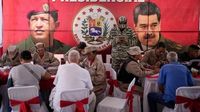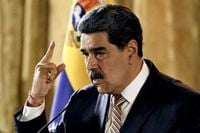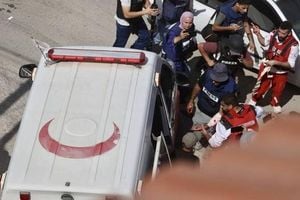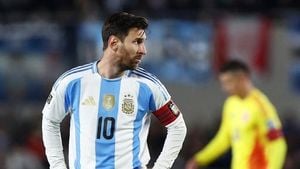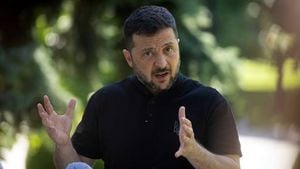On the eve of a tense late summer in 2025, the waters off Venezuela have become the focal point of a dramatic standoff between Washington and Caracas, with implications that ripple far beyond the Caribbean. The United States, under President Donald Trump’s administration, has dispatched a formidable naval force—including up to seven warships, a nuclear-powered submarine, and thousands of Marines—toward the South American nation. Officially, the mission is to combat drug trafficking, but the deployment has reignited old suspicions and fresh fears of foreign intervention in Venezuela, a country already battered by political and economic turmoil.
According to AP, the U.S. is boosting its maritime force in the region as part of an intensified anti-drug operation targeting Latin American cartels allegedly linked to Venezuela. American vessels, including the USS San Antonio, USS Iwo Jima, USS Fort Lauderdale, USS Lake Erie, and USS Newport News, are expected to arrive off the Venezuelan coast by the end of August, bringing more than 4,500 service personnel, including 2,200 Marines, as confirmed by a U.S. defense official who spoke on condition of anonymity.
The Trump administration’s rationale for this show of force centers on the so-called "Cártel de los Soles" (Cartel of the Suns), a group it has designated a terrorist organization. In July, U.S. officials described it as a Venezuela-based criminal syndicate allegedly headed by President Nicolás Maduro and other high-ranking Venezuelan figures. The U.S. government claims this cartel provides support to foreign terrorist organizations threatening American security, specifically naming Venezuela’s Tren de Aragua and Mexico’s notorious Sinaloa Cartel as beneficiaries.
Yet, the existence of the Cartel de los Soles is hotly contested. Both Venezuela and its neighbor Colombia have dismissed the group as a fiction, and the U.S. State Department’s own anti-drug report from March 2025 made no mention of it or of any direct connection between Maduro and narcotrafficking. According to the InSight Crime think tank, the term originated in 1993 when Venezuelan media coined it after two generals, whose uniforms bore sun insignias, were implicated in drug trafficking. "Rather than a hierarchical organization with Maduro directing drug-trafficking strategies, the Cartel of the Suns is more accurately described as a system of corruption wherein military and political officials profit by working with drug-traffickers," the organization stated on its website.
Phil Gunson, an analyst at the International Crisis Group, told AFP, "There is no such thing, so Maduro can hardly be its boss." He acknowledged that while there is evidence of "complicity" between people in power and organized crime in Venezuela, "direct, incontrovertible evidence has never been presented" for the existence of an organized cartel by that name.
Despite these doubts, the Trump administration has doubled down, raising the bounty on Maduro’s head to a staggering $50 million for information leading to his capture on drug charges. U.S. Attorney General Pam Bondi announced, "Department of Justice and State Department are announcing a historic $50-million reward for information leading to the arrest of Nicolas Maduro." This move, while dramatic, has only served to heighten tensions and speculation within Venezuela and across the region.
President Maduro, for his part, has responded with characteristic defiance. At a military ceremony in Caracas, he declared, "There’s no way they can enter Venezuela. Today, we are stronger than yesterday. Today, we are more prepared to defend peace, sovereignty and territorial integrity." He has ordered the deployment of Venezuelan warships and drones to patrol the nation’s coastline and announced the activation of 4.5 million civilian militia members—a figure viewed skeptically by outside observers—to confront "any threat." Maduro has also thanked Colombian President Gustavo Petro for sending 25,000 troops to secure their shared border, framing this as a joint effort to safeguard regional security.
Meanwhile, Venezuela’s UN Ambassador, Samuel Moncada, has taken the fight to the diplomatic arena, lodging a formal protest with UN Secretary-General Antonio Guterres and condemning the U.S. buildup as a violation of the UN Charter. "It’s a massive propaganda operation to justify what the experts call kinetic action—meaning military intervention in a country which is a sovereign and independent country and is no threat to anyone," Moncada told reporters. He also scoffed at the use of a nuclear submarine in an anti-drug operation, saying, "It’s ridiculous to think that they’re fighting drug trafficking with nuclear submarines."
Inside Venezuela, the government’s narrative of foreign aggression has been used to rally domestic support. Civil defense units are training weekly, and the specter of invasion has become a rallying cry for Maduro and his allies. The opposition, led by Maria Corina Machado and her ally Edmundo González—whom the U.S. recognizes as the legitimate winner of the 2024 presidential election—has expressed support for Washington’s latest policies, adding another layer of complexity to the internal political landscape.
From Washington’s perspective, the deployment is not just about Venezuela. U.S. Secretary of State Marco Rubio emphasized that designating groups like Tren de Aragua as global terrorist organizations gives the U.S. broad latitude to use military, intelligence, and other assets to target these groups. The Pentagon has been directed to prepare a range of options, and White House press secretary Karoline Leavitt noted, "Many Caribbean nations and many nations in the region have applauded the administration's counter drug operations and efforts."
This is not the first time President Trump has attempted to use military force against drug cartels in foreign nations. Earlier in May, he proposed sending U.S. troops to assist Mexican President Claudia Sheinbaum in combating drug trafficking, but that offer was promptly rejected by Mexico.
As the U.S. naval task force looms off Venezuela’s coast, the situation remains fraught with uncertainty. While military officials insist the deployment is aimed at curbing drug trafficking, many in Venezuela and beyond see it as a calculated pressure campaign—one that could easily escalate if mismanaged. Geopolitical experts like Mariano de Alba suggest that if the Trump administration truly intended regime change, it would likely opt for a surprise action rather than an overt buildup, hinting at the complex gamesmanship at play.
For now, the world watches as both sides dig in, each using the standoff to bolster their own narratives and political fortunes. Whether this latest escalation leads to real confrontation or fizzles into yet another chapter of U.S.-Venezuela brinkmanship remains to be seen. But for the people of Venezuela, already living under immense strain, the saber-rattling from both Washington and Caracas offers little comfort and even less clarity about what comes next.
